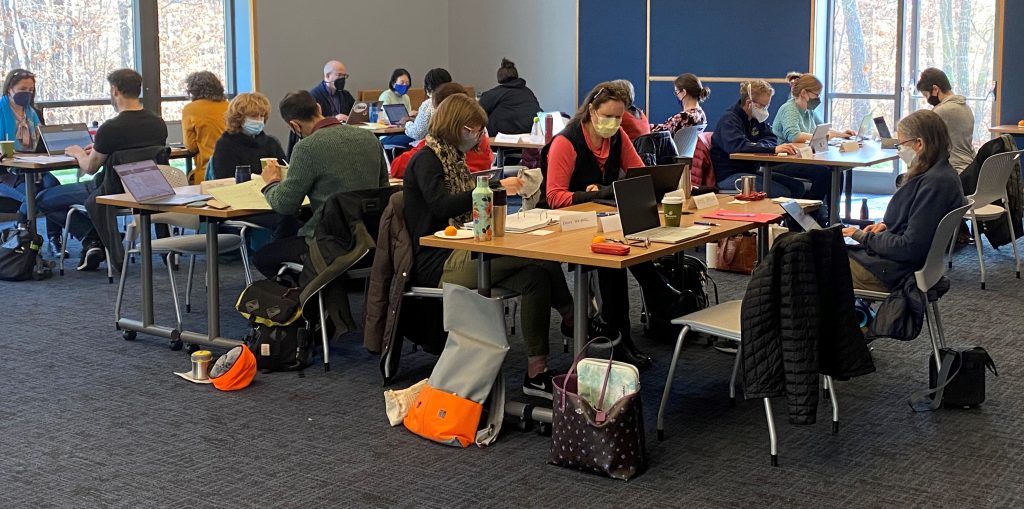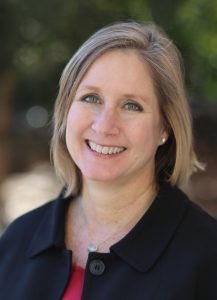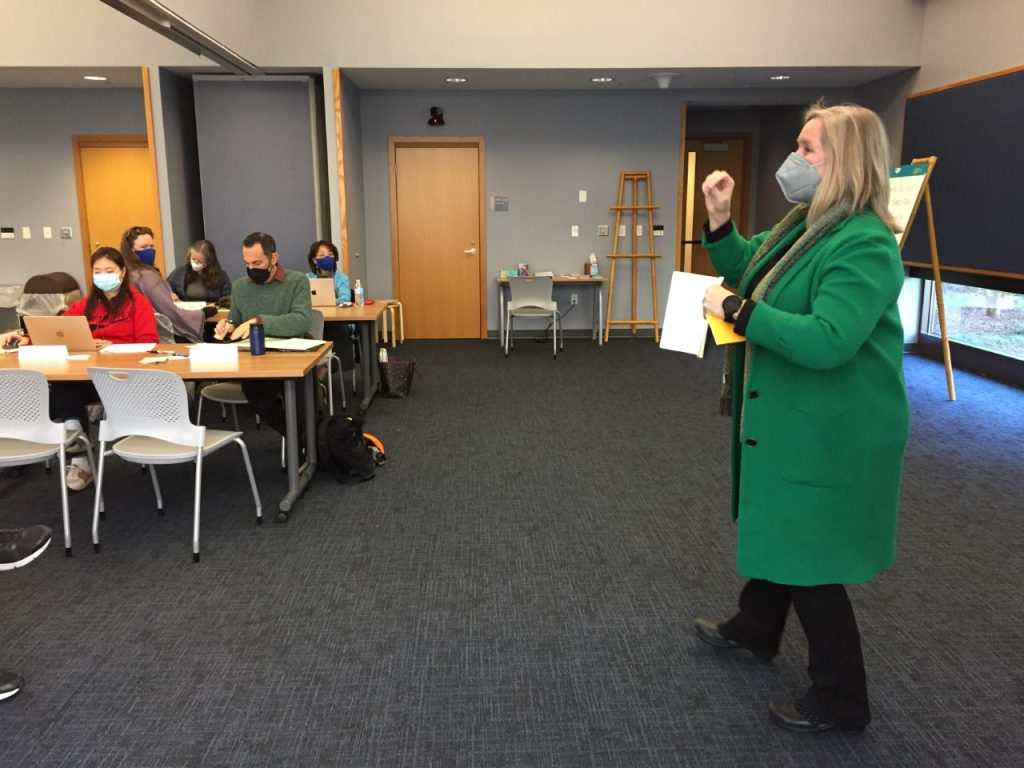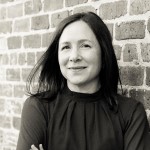DURHAM, N.C. — English professor Charlotte Sussman doesn’t get much time in her role as department chair to work on her latest book project, an edited collection of essays on migration in and out of Europe.
“At least not during daylight hours,” Sussman said.
But a recent workshop brought a welcome change to that. Sussman was one of 22 faculty who gathered Dec. 13 for an end-of-semester writing retreat hosted by the Duke Faculty Write Program.

Most of them know all too well the burnout faculty and students face at the end of the semester. But for a few precious hours, they hit pause on the constant onslaught of emails, meetings, grading and other duties to work alongside fellow writers.
The participants sat elbow-to-elbow around small tables in a sunlit room at the Duke Integrative Medicine Center. Some scribbled on pads of paper; others peered over their laptops.
Each person used the time to focus on a specific writing project. Sussman aimed to tackle an introduction for her 34-essay collection. Others spent the day working on a grant application, a book chapter, a course proposal, a conference presentation.

“We have so many negative associations with writing because there’s always something more to do,” said associate professor of the practice Jennifer Ahern-Dodson, who directs the program. “I want to change the way people experience writing.”
Ahern-Dodson encouraged the group to break their projects into small, specific tasks as they worked toward their goals. It might be reading a journal article, drafting an outline, organizing some notes, even just creating or finding a file.
After a brief workshop, she kicked off a 60-minute writing session. “Now we write!” she said.
The retreat is the latest installment in a series that Ahern-Dodson has been leading for over 10 years. In a typical week, most of these scholars wouldn’t find themselves in the same room. There were faculty and administrators from fields as diverse as history, African and African American Studies, law, psychology, classics, biostatistics. New hires sitting alongside senior scholars with decades at Duke.

“I really like the diversity of the group,” said Carolyn Lee, Professor of the Practice of Asian and Middle Eastern Studies. “It’s a supportive environment without any judgement. They all have the same goal: they want to get some writing done.”
Sussman said such Faculty Write program get-togethers have been “indispensable” to bringing some of her writing projects over the finish line.
Participants say the program not only fosters productivity, but also a sense of connection and belonging. Take Cecilia Márquez, assistant professor in the Duke History Department. She joined the Duke faculty in 2019, but within months the world went into COVID-19 lockdown.
“This was my way to meet colleagues,” said Márquez, who has since started a writing group for Latinx scholars as an offshoot.
The writing retreats are free for participants, thanks to funding from the Office of the Dean of Trinity College of Arts and Sciences and the Thompson Writing Program. Participants enjoy lunch, coaching and community in what’s normally a solitary activity.
“I appreciate the culture of collaboration,” said David Landes, who came to Duke this year as Assistant Professor of the Practice in Duke’s Thompson Writing Program. “In the humanities our work is intensely individualized.”

Retreats are one of many forms of support offered by the Faculty Write program: there are also writing groups and workshops on topics such as balancing teaching and scholarship or managing large research projects.
“One of the distinguishing features of Faculty Write is the community that extends beyond one event,” Ahern-Dodson said. “Many retreats are reunions.”
After two hours of writing, Ahern-Dodson prompted the group to take a break. Some got up to stretch or grab a snack; others stepped outside to chat or stroll through the center’s labyrinth at the edge of Duke Forest.
It’s more than just dedicated writing time, Ahern-Dodson said. It’s also “learning how to work with the time they have.”
The retreats offer tips from behavioral psychology, writing studies, and other disciplines on time management, motivation, working with reader feedback, and other topics.
As they wrap up the last writing session of the day, Ahern-Dodson talks about how to keep momentum.
“Slow-downs and writing block are normal,” Ahern-Dodson said. Maybe how you wrote before isn’t working anymore, or you’re in a rut. Perhaps you’re not sure how to move forward, or maybe writing simply feels like a slog.
“There are some things you could try to get unstuck,” Ahern-Dodson said. Consider changing up your routine: when and where you write, or how long each writing session lasts.
“Protect your writing time as you would any other meeting,” Ahern-Dodson said.
Sharing weekly goals and accomplishments with other people can help too, she added.
“Celebrate each win.”
Ultimately, Ahern-Dodson says, the focus is not on productivity but on meaning, progress and satisfaction over time.
“It’s all about building a sustainable writing practice,” she said.

Coming soon: On Friday, Jan. 27 from 12-1 p.m., join Vice Provost for Faculty Advancement Abbas Benmamoun for a conversation about how writing works for him as a scholar and administrator. In person in Rubenstein Library 249 (Carpenter Fletcher Room)
Get Involved: Faculty and staff are invited to sign up for writing groups for spring 2023 here.
Learn more about sustainable writing practices: “The Productivity Trap: Why We Need a New Model of Faculty Writing Support,” Jennifer Ahern-Dodson and Monique Dufour. Change, January/February 2023.

